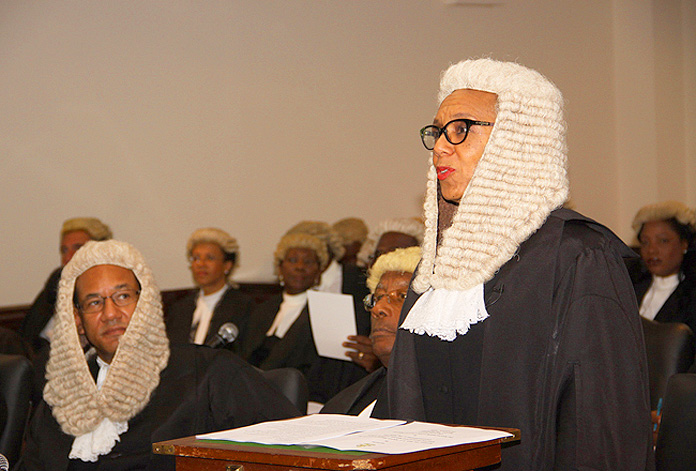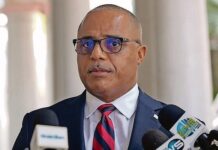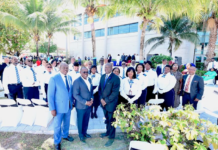Attorney General Addresses the Senate on Petroleum Bill

NASSAU, The Bahamas – Attorney General and Minister of Legal Affairs Senator the Hon. Allyson Maynard-Gibson said the two bills presently before the Senate will align the Bahamas’ petroleum industry with 21st century international best practices and prepare Bahamians to benefit more from oil exploration, providing commercially viable quantities are discovered.
The Attorney General addressed the Petroleum Bill 2014 and Sovereign Wealth Bill Fund 2015 in the Senate on Wednesday, January 3. The Petroleum Bill provides for the exploration and production of petroleum matters and the Sovereign Wealth Fund Bill provides for the establishment and management of a sovereign wealth fund for matter related.
The Attorney General said industry and regulation of the Petroleum Act 1971 which came into effect in 1978 and is presently on the books in The Bahamas have changed significantly.
“Government and our national and international advisors have concluded that we are at an encouraging time in our nation’s history. The technology available now will allow us to be able to explore the possibilities of this sector with minimal environmental risk,” she said.
The Attorney General pointed out the potential employment opportunities available from “downstream activities” related to this industry.
“Those who wish to explore for oil are involved in the upstream sector which includes searching for crude oil and natural gas fields, drilling exploratory wells, and subsequently drilling and operating the wells that recover and bring the crude oil and/or raw natural gas to the surface.
“Midstream operations mostly include transportation and storage, such as pipelines and gathering systems.
“Upstream, midstream and downstream require lead to strong research and development and exceptional innovation. These attributes in turn require modern universities,” she said.
The Attorney General noted that if there is oil in viable quantities decisions would have to be made regarding when and which sectors should be developed. Additionally, rapid expansion of the research and development skillset; universities and innovation are also necessary.
The Attorney General highlighted important sections of the Petroleum Bill noting the following key frameworks:
*Governance regulations and institutional framework
*Legal, licensing and contractual framework
*Fiscal and commercial framework
*Health, safety and environmental framework
Along with the key frameworks, she told Senators are provisions which address miscellaneous matters which are “pertinent” to petroleum sector operations, including default and disputes; offences and penalties; repeal and transition of existing related laws.
According to the Attorney General, the Government is presently setting the framework for exploration, which allows the following:
*Exploration drilling conducted in search of an undiscovered reservoir or oil or gas;
*Upon success in the initial exploratory drilling, to allow further drilling to determine the size, grade and configuration of a mineral deposit and the determination that the deposit can be commercially developed;
*To drill wells and extract minerals and resources from wells based on data gathered in the first two stages.
The legislation seeks to accommodate the above stages by provision of exploration licenses, permits and production leases, she stated.
Regarding section 2, the Attorney General explained that interpretation defines exploration licenses, permits and production leases respectively as:
“Exploration Licence” confers an exclusive right to explore for petroleum within the land or in any submarine area referred to therein;
“Permit” confers a non-exclusive right to carry out anywhere within the land, or in any submarine area referred to therein any geological or geophysical studies or surveys, including seismic;
“Production lease” confers an exclusive right to produce and develop a discovery within the land or in any submarine area referred to therein;
“Part 3 of the Bill provides for financial provisions; particularly it provides for royalties, fees and rents, compensation for environmental damage and ancillary matters, and also the duty to maintain records and annual reporting.
What is important from this legislative formula is that the royalty will be calculated against the selling value of the petroleum prevailing in the market at that time or as determined by the minister with responsibility for petroleum. This is clearly advantageous to the Commonwealth of The Bahamas,” she added.









